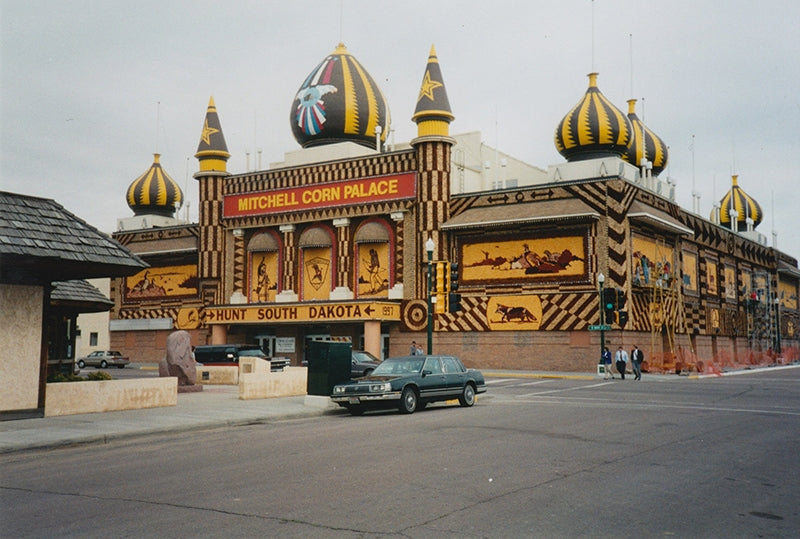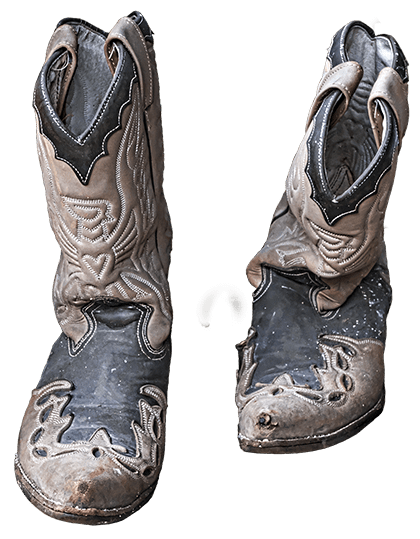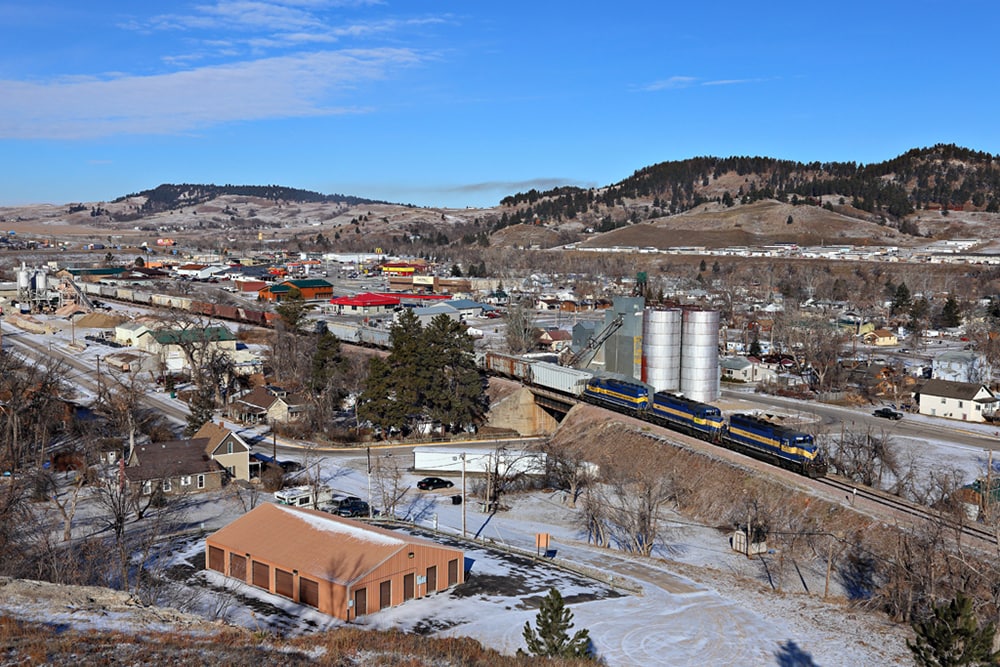
[Editor’s Note: this part of the story took place in the mid-1980s.]
A blast of superheated wind hit me in the face as I walked out of that air-conditioned restaurant in Mitchell, South Dakota. The fieriness of the tarmac transferred instantly to my feet, even through my heavy boots. It took only a few minutes for my clothes to become clingy. The sun’s radiation would have burned through my shirt had it not been for the leather jacket. I couldn’t touch the paint on my helmet without scalding my hands, so I donned it by the straps.
While mounting my bike, I wondered if the grain on the Mitchell Corn Palace had popped, so I drove the short distance to check it out. “Is that a concern?” I asked the security guard.
“I hear that a lot,” he smiled, “No, the wall never gets to the 400 degrees necessary to pop the corn, that’s not really a threat. We experience a far more serious threat in the wintertime.”
“Let me guess?” I responded. “It turns into cornsicles and the kids eat them off the wall.”
“No, but you’re close,” he answered. “The squirrels eat them. They get real hungry when the ground is covered with snow and become very aggressive. They can even reach the corn at the top of the walls.”

Mitchell Corn Palace. Courtesy of Wikimedia Commons/brx0.
“No kidding!” I laughed. “What a great resource for them. In San Diego, the termites eat the buildings.”
“I’ve got a nephew in San Diego,” he responded, “he’s in the Navy.”
“I hear that a lot,” I smiled.
By now, my black jacket was so hot, it threatened to scorch my skin. I did a U-turn and headed for the cooling breeze of the highway.
When I heard a police siren behind me, I pulled over to let him pass. He didn’t, and parked behind me. Barney Fife got out and asked, “Don’t you know it’s illegal to pull a U-turn on Main Street?”
“Actually, I don’t. I’m not from…”
“Ignorance of the law is no excuse, fella, you broke it and now you’re going to get a ticket.”
“But there’s not more than a dozen cars on this big wide street, and they’re all parked. Who was I endangering?”
“What if there was an emergency vehicle rushing to the hospital, you woulda turned right in front of it.”
“Don’t they have sirens?”
“Are you being a smartass?”
“Is there a ticket for that too?”
“Look Buster, keep it up and you’ll be kept overnight for disorderly conduct.”
“No I won’t, officer; I have a recording of this encounter and you won’t be able to make the case.” I pulled a microcassette recorder out of my pocket and revealed it to him. I only used it in the evenings to keep a record of the day’s events, but he didn’t know that.
“Look, I’m not trying to cause any trouble here, but I feel like I’m getting a ticket for nothing.”
“You have 30 days to pay it. If you don’t, your name will be entered into the National Register of Delinquent Traffic Offenders.”
“I’ve never heard of the DTO register, but I don’t want to be on it, so just give me the ticket.”
(It was only $20. When I got home, I appealed to the clerk of the court, stating that I probably wouldn’t visit Mitchell again due to overzealous policing. I got a letter back a few weeks later stating that the ticket had been rescinded. That was worth the price of a stamp.)
At 85 MPH, a wind tornado swept through the zippered vents of my jacket, sopping up the sweat, but the helmet stayed hot to the touch. I worried that I’d pass out once the milkshake I’d just consumed reached helmet temperature.
When the highway crossed the Missouri River in Chamberlain, I found river access near the marina, shed my jacket and helmet, and dove into the water — boots and all. The water instantly restored my faculties. Then I walked back to my bike, donned the jacket and helmet, and rode out dripping like an Oakland garbage truck. The engine sizzled and steam rose off the cylinders. The people in the parking lot looked like they’d seen an alien visitor.
The clothes dried in a few miles, but my boots acted like radiators for the next couple of hours and kept me comfortable.

Courtesy of Pixabay.com/anaterate.
No longer preoccupied with the heat, I found my wandering mind pondering the words of the cranky farmer. [See Part 28 in Issue 170 – Ed.] If he’s right and the pharmaceutical companies are buying clinical trials and ghost-writing fake peer reviews to distort science, then how can we trust their claims? And if we can’t trust their claims, what can we trust, their list of warnings? They are usually 10 times longer than the list of benefits. Is that a risk worth taking?
Seems like every year, we hear of some drug which turned out to be more harmful than helpful. Vioxx and several other dangerous drugs were even approved by the FDA. Is no-one bound by the Hippocratic Oath anymore?
What if university medical departments are financed by the drug companies? Is the public getting the best healthcare from their university-trained doctors; are they just pushing Big Pharma sales? As the solution to most problems seems to be some sort of pill, maybe we should be a little more discerning about taking what we are prescribed?
“Don’t worry, it’s covered by insurance,” we’re told, as if it’s free. Insurance funds are always sourced from the public, even if it’s government insurance. So, one way or another, we’re paying for it. Who’s monitoring the costs, the Pharma-sponsored politicians?
What about food — the other industry under the FDA’s jurisdiction? Seems the people who manage the FDA always hail from the food or pharmaceutical industries, or they work for them afterwards. Are they acting in our best interests? Are those granola-munching hippies right to protest the food supply? Is it really full of pesticides and hormones? Is that why we need so many pills? Why do we suffer from so many illnesses that were virtually nonexistent at the turn of the last century? Is our food supply tainted, or are we overmedicated? Where are the studies to research these issues, or will nobody finance them? Shouldn’t the FDA be financing them?
Why are there no studies of psychosomatic illnesses? Some research indicates that 80 percent of doctor visits are a product of stress and anxiety. If we continually treat the symptoms with pills, we benefit Big Pharma. Shouldn’t we be treating the origin of the anxiety? Maybe we can start by telling these patients to stop watching the news? That has to be one of the biggest stress producers extant. Is the news crafted to instill stress?
Hallucinogenic drugs got a bad reputation in the ’60s because a few people jumped off buildings thinking they could fly. Others, like myself, who were under careful supervision, experienced life-changing revelations which eliminated our fear of mortality. Since then, I’ve treated life like a vacation — in search of its joys rather than dreading its termination. It’s been said that all anxiety is based in a fear of death. Perhaps hallucinogenic drugs like LSD or Ayahuasca deserve more investigation.
Why isn’t more research being done on the placebo effect? It’s been proven to be as effective as drugs for about a third of study participants. Is the FDA is not interested because there’s no money in it? Why aren’t our politicians stepping in? Is it more profitable for them to keep quiet? How concerned are they for the people they represent?
What about the energy companies, the insurance industry, the bankers and credit card companies, the consumer product manufacturers, the military-industrial complex, the environmental lobby, the media; are they also buying politicians? Most of these companies are owned by large conglomerates, but who owns them, Asia, OPEC, some other foreign entity? Who’s representing the interests of the American people? Who really runs America? Is our democracy a sham? Is this what’s politicians mean by the New World Order?
Why does so much news reporting make no sense? Some things are amplified to ridiculous proportions and others, which hurt us much more, are virtually ignored. For example, they’ll go on for months about illegal drugs, AIDS, car safety, and gun violence, but ignore for decades the tobacco industry — which is responsible for more deaths than all those causes combined?
You know what your problem is, Montana, I said to myself, you’ve got way too much time to think on a boring highway like this.
Thankfully, the Sturgis sign appeared before I was overwhelmed by this cacophony of skepticism. The town was radically different from the week before. Pickup trucks now outnumbered motorcycles on Main Street. The banners were down and all the motorcycle swag shops were back to being the barber shop, the hardware store, the pharmacy, the gift store, and so on. One of the patrons at the bar said these shops derived 50 percent of their annual income from bike week. That explained why they were willing to tolerate the chaos. Another said he loved bike week because it was the most exciting thing to happen all year in his sleepy town. Still another suggested with a smirk that it was also the most titillating. I got the feeling it would be on again next year.
I finally reached the Bhagwan’s compound near Belle Fourche past dinnertime. Melody beamed from ear to ear when she saw me.
“I didn’t think you were coming,” she said as we kissed, “But you’re not too late to have something to eat. What would you like?”
“Whatever you fetch me will be fine Melody, but first, I’m taking a dip in the river.”
I ran down to the shore, stripped, and jumped in. This is what heaven must feel like, I thought to myself as I washed away my sins.
Cooled, refreshed, and wide awake, I joined Melody and the rest of the group. It was much larger than the week before, perhaps because this was the Bhagwan’s last gathering of the season. He was seated cross-legged on a picnic table. We thought he was about to make an address, but he stayed silent. He looked over and I wondered if he was waiting for me to finish eating. I nodded. He smiled.
Surprisingly, he didn’t say a word for another 20 minutes. As the crowd grew restless, he continued to look around with a smile on his face. Someone asked if he planned to offer a lecture. “When we’re ready,” he responded, then stayed silent. Some of the crowd left, then some more. After sitting in one spot for almost 40 minutes, the crowd was as quiet as the river and the trees.
“I think we’re ready to proceed,” he announced.
Header image: Sturgis, South Dakota. Courtesy of Wikimedia Commons/Jerry Huddleston.
Previous installments appeared in Issues 143, 144, 145, 146, 147, 148, 149, 150, 151, 152, 153, 154, 155, 156, 157, 158, 159, 160, 161, 162, 163, 164, 165, 166, 167, 168, 169 and 170.



